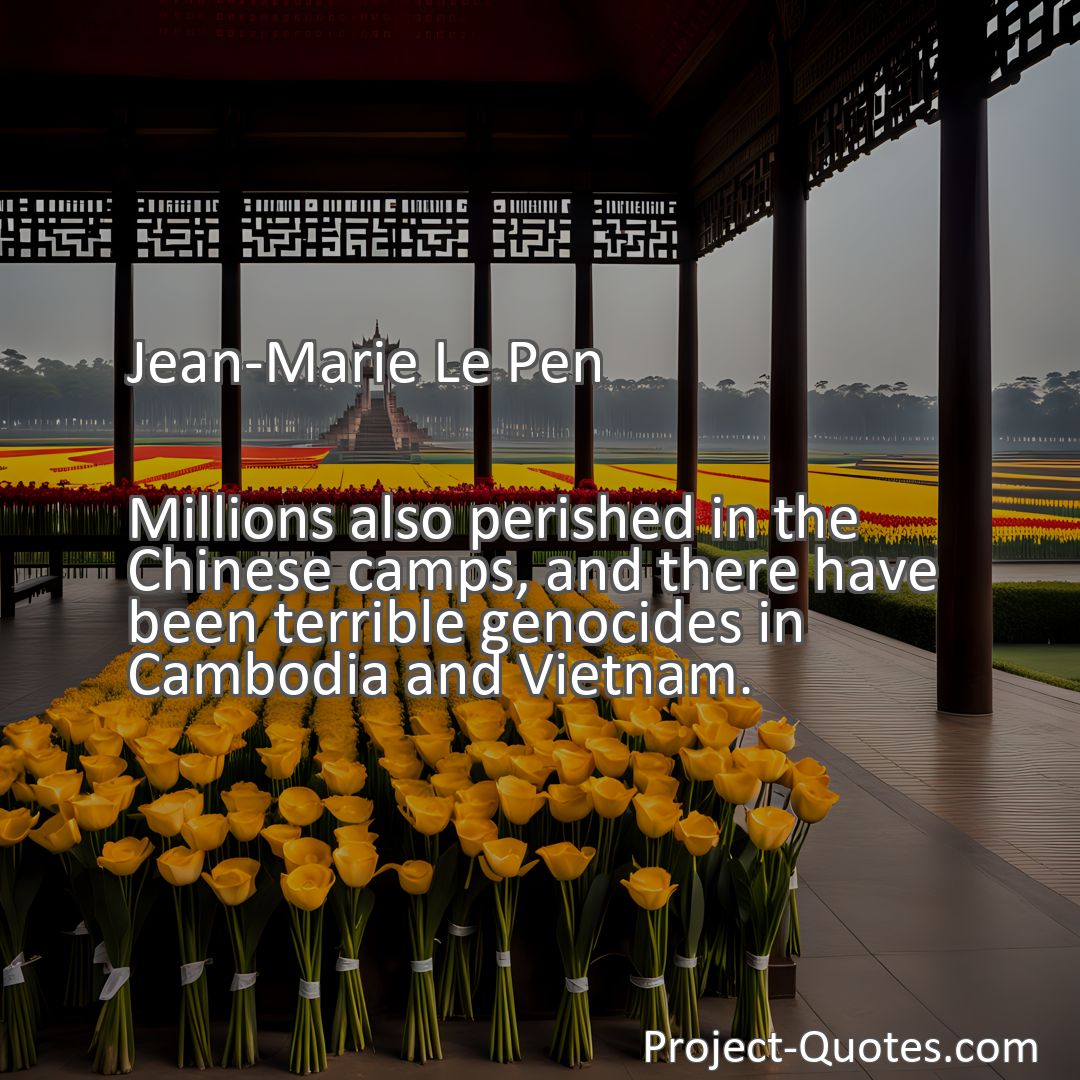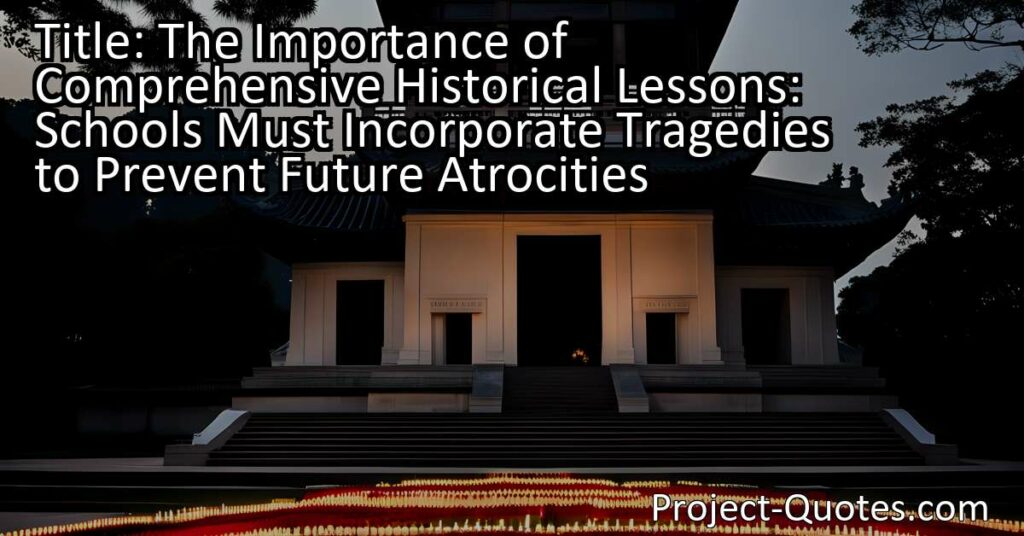Millions also perished in the Chinese camps, and there have been terrible genocides in Cambodia and Vietnam.
Jean-Marie Le Pen
To prevent future atrocities, it is crucial for schools to incorporate comprehensive historical lessons. By teaching students about the tragedies of the past, such as the Chinese camps, the Khmer Rouge regime in Cambodia, and the Vietnamese genocide, we can instill empathy, tolerance, and a commitment to human rights. By equipping younger generations with this knowledge, we can work towards preventing similar horrors from happening again and creating a safer world for all.
Table of Contents
Meaning of Quote – Millions also perished in the Chinese camps, and there have been terrible genocides in Cambodia and Vietnam.
Remembering Tragedy: The Dark Shadows of History
Introduction:
Throughout history, humankind has been scarred by unspeakable acts of violence and brutality. It is essential to remember these dark chapters in order to ensure they are never repeated. One such chapter took place in China, where millions lost their lives in camps. Similarly, Cambodia and Vietnam have also witnessed horrific genocides. In this article, we will explore the tragedies that unfolded in these nations, shedding light on the magnitude of suffering endured by countless individuals. By understanding these events, we can strive for a better future, one built on empathy and tolerance.
The Tragedy of Chinese Camps:
Jean-Marie Le Pen’s quote aptly highlights the vast number of lives lost in Chinese camps. During Chairman Mao Zedong’s regime, China witnessed the rise of labor camps, specifically targeting those deemed a threat to the communist ideology. From intellectuals and dissidents to landowners and religious figures, anyone labeled as a potential counter-revolutionary was sent to these camps. The conditions were harsh, and the detainees endured forced labor, malnutrition, and rampant abuse.
Mao’s Cultural Revolution, which lasted from 1966 to 1976, aimed to eradicate capitalism and bourgeois influences from Chinese society. Consequently, millions of individuals were forcibly relocated to rural areas and subjected to extreme labor and indoctrination. While official numbers are disputable due to government censorship, estimates suggest that between 1 to 20 million individuals perished during Mao’s reign.
The Tragic Genocide in Cambodia:
Moving forward, let us turn our attention to the atrocities that unfolded in Cambodia under the Khmer Rouge regime led by Pol Pot. In a twisted pursuit of agrarian communism, Pol Pot sought to create an entirely self-sufficient society by eradicating urban and Western influences. The regime targeted intellectuals, professionals, and those connected to the previous capitalist regime under Lon Nol.
Between 1975 and 1979, nearly two million Cambodians, roughly a quarter of the population, fell victim to the Khmer Rouge’s reign of terror. People were forcibly relocated to collective labor camps, where they endured grueling work, malnutrition, and atrocious living conditions. Additionally, the regime carried out mass executions, often through the infamous Killing Fields, where countless lives were needlessly extinguished.
The Horrors of the Vietnamese Genocide:
Jean-Marie Le Pen also mentions the genocides in Vietnam, which were a result of the Vietnamese communist regime’s pursuit of ideological purity. After the fall of Saigon in 1975, North Vietnam’s Communist regime imposed social and political reforms aimed at consolidating power and spreading communism throughout Vietnam. These reforms involved targeting various groups, such as Nguyen Dynasty loyalists, ethnic minorities, religious figures, and perceived bourgeois elements.
Thousands of individuals were subjected to arbitrary arrests, torture, and execution. The most chilling incident occurred in 1978 when the Vietnamese government launched a campaign against the ethnic Chinese population, accusing them of being a fifth column influenced by capitalist ideologies. During this campaign, countless ethnic Chinese were forcibly expelled from Vietnam, leading to further loss of life and immense suffering.
Learning from History:
Acknowledging the magnitude of these tragedies helps create a collective responsibility to prevent such atrocities from happening again. By understanding the horrific consequences of ideologically driven violence, we can work towards promoting human rights, inclusivity, and peace.
Education plays a pivotal role in this process. Schools must incorporate comprehensive historical lessons that shed light on genocides and tragedies, emphasizing the importance of tolerance, respect, and informed decision-making. Educating younger generations about historical events like those mentioned above not only equips them with knowledge but also enables them to develop empathy for others who have experienced suffering firsthand.
Moreover, international organizations and governments should work together to prevent or intervene in situations where genocide and massive human rights abuses are imminent. By fostering diplomatic relations, encouraging strong human rights policies, and supporting vulnerable populations, we can strive to make the world a safer place for all.
Conclusion:
In concluding, the historical tragedies discussed in this article – the Chinese camps, Cambodia’s Khmer Rouge regime, and the Vietnamese genocide – serve as painful reminders of our capacity for cruelty and destruction. It is incumbent upon us to remember these events and work towards a more compassionate world, fostering understanding, empathy, and respect for diversity. By doing so, we uphold the memory of the millions who perished and strive to ensure that such atrocities remain confined to the pages of history.
I hope this quote inspired image brings you hope and peace. Share it with someone who needs it today!


